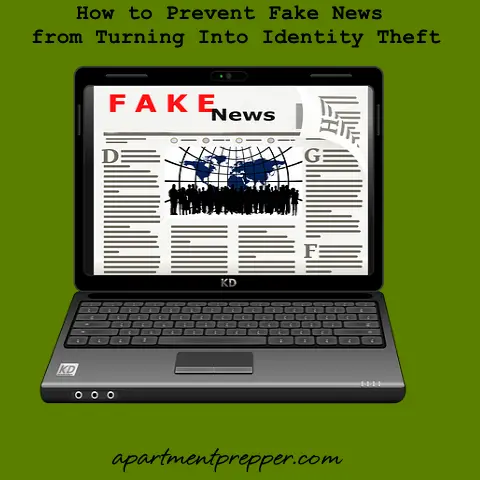Many people think “fake news” is usually those crazy stories you see on social media and never really consider how these wild stories can affect them personally. I can tell you the fake news being spread in our neighborhood very recently did not seem all that crazy.
A couple of weeks ago, a letter from “Solid Waste Management” was left in the mailbox of many of our neighbors. The letter was advising people that they left unacceptable items in their recycling bin. The letter mentioned a $45 fine and asked people to visit a certain website for more information. A lot of people got worried. As calls mounted to the company that actually collects trash, they realized a fake letter was issued to the residents. The real company never sent the letter and had to warn the neighborhood to disregard the fake news. The link given in the letter was fraudulent and was designed to fool people into giving personal information. The post below has some great tips to avoid getting misled.
How to Prevent Fake News from Turning Into Identity Theft
Written by Krystal Rogers-Nelson
Some fake news is so outrageous that you can easily dismiss it. Other stories, however, convey plausible facts, such as Google’s alleged intention to buy Apple. The story was proven false, but it demonstrates how fake news can affect society’s financial fabric and consumer confidence. Fake news can pose other dangers, too, including credit card and identity theft.
Understanding how that theft occurs and, more importantly, how to prevent it requires information and action. Here, you’ll find tips both for recognizing and avoiding dangerous fake news scams.
Identify the Goals behind Fake News
Fake news has become so widespread in the past year that Collins Dictionary termed it the 2017 word of the year. The dictionary reports usage of “fake news” has increased by 365% since 2016. Identity theft, unfortunately, follows a similar trajectory, increasing from thirteen million cases in 2015 to over fifteen million in 2016.
There may be a reason for the correlation. False news stories and websites seek to misinform the public, to influence opinions, to ruin reputations, and sometimes to steal information. Fake news creators use multiple mechanisms to achieve their goals, ranging from targeted advertisements to paywalls. They may convince you to share personal information, such as a birthdate or credit card number, or to click on a virus-laden link.
Understand How Fake News Works
Fake news operates like an infectious disease. Its creators seed the false story through a highly targeted audience. The audience does the rest of the work for them, making the story go “viral” by sharing it across social networks.
When you disclose information to a fake news site—and encourage others to do the same by sharing the article or webpage—the thief behind the site can put that data toward several ends. Some may go on a shopping spree and empty your bank account. Others might assume your identity, eventually causing problems when you try to get a loan or apply for a new job. In severe cases, their activities could cause you to be accused of a crime you didn’t commit.
Look for Warning Signs
To keep yourself from falling for fake news, use the following three tips. They can help you distinguish between truth and falsehood.
- Look at the domain name. If the domain name isn’t the official one for a brand or person, leave the site. It’s probably fake at best and nefarious at worst.
- Check the spelling and grammar. If the site you’re visiting has a lot of basic spelling and grammar errors, use caution; it may belong to a thief or hacker.
- Run a gut check. If you feel uncertain when visiting a site or reading a news story, get out of there. It’s better to be safe than sorry.
Take Steps to Protect Your Personal Information
With a little extra attention, you can hopefully avoid fake news and scam websites altogether. But even the most aware web browser can fall for a well-designed scheme, so it’s important to take a few additional steps to safeguard your identity.
Vet your social circles
Since fake news spreads on social media most often, ensure your connections are people you know, not fake profiles.
Update your passwords
Make identity thieves work harder by using strong passwords at all the sites you frequent.
Freeze your credit
If you’re not actively looking to take out a loan, freezing your credit makes it difficult for thieves to use your information to their advantage.
Install apps to detect fake news
Technology like Google’s fact-checking feature and B.S. Detector can help guard against fake news.
Purchase identity theft protection
Finally, invest in identity theft protection to monitor your identity and credit—and to make recovery from ID theft easier if it happens.
You can’t stop the spread of fake news, but you can prepare for it. By learning about what fake news is, how to avoid it, and which steps can help protect your personal information, you’ll keep your identity where it belongs—with you.
About the Author:
Krystal Rogers-Nelson is a freelance writer living in Salt Lake City, Utah, specializing in cyber security, tech, green living and home security. You can read her other articles here: https://krystalrogersnelson.contently.com
Try Prime for free

